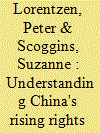| Srl | Item |
| 1 |
ID:
114575


|
|
|
|
|
| Publication |
2012.
|
| Summary/Abstract |
Dagong ?? as a way of life gives rise to many abuses and rights violations against China's 200 million migrant workers. This article analyses the intricate issues of rights deprivation, rights consciousness and personal strategies of Chinese migrant workers with the research findings from a large sample survey completed at the end of 2005. The data confirm the occurrence of many types of rights abuses, significant levels of rights consciousness, and preference for legal and institutionalized means for rights defence besides the use of private resources. Furthermore, the findings reveal that the experience of discrimination, consciousness of rights and choice of personal strategies are affected by personal backgrounds like age, gender, education and occupational status before migration, which carry implications for policy. Finally, the article comments on the ongoing debate about "rights consciousness" versus "rules consciousness" in contentious Chinese politics.
|
|
|
|
|
|
|
|
|
|
|
|
|
|
|
|
| 2 |
ID:
142568


|
|
|
|
|
| Summary/Abstract |
Claims that China's people are exhibiting a rising “rights consciousness” have become commonplace, with some suggesting this phenomenon is driving political change. Yet it is often unclear what the concept means, leading to ambiguous or contradictory conclusions from field research. In order to create a basis for more systematic analysis, we develop a rational choice framework that characterizes three different factors that could lead to rights-conscious behaviour: changing values, changing government policies, and changing expectations of the behaviour of others. What rising rights consciousness implies for social stability can vary dramatically, depending on which change is at work. Rights consciousness resulting from changes in values or in shared expectations of behaviour is destabilizing for the CCP's continued rule, whereas rights consciousness derived from government policies has a stabilizing effect. While in practice these can be interrelated in complex ways, empirical research would benefit from greater attention to these distinctions.
|
|
|
|
|
|
|
|
|
|
|
|
|
|
|
|